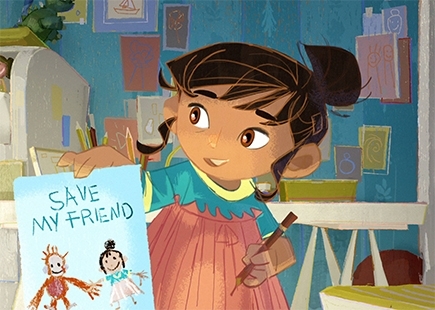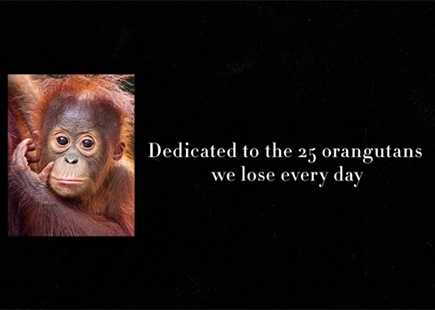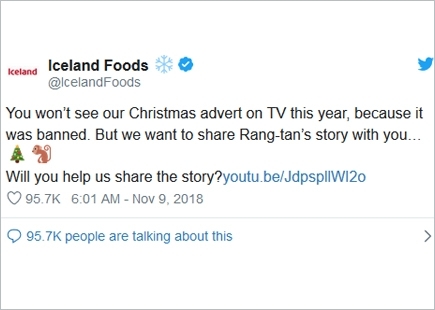When Wrong is Right: How the banned Iceland ad is a great success story

The Background
So I’ve gone from the ridiculous (though fun) Greggs Christmas stunt to the sublime Iceland ad in one week. A serious gear shift!
For those living in a cave, at the tail end of last week the internet exploded with the revelation that Iceland’s Christmas advert had been banned from TV.
Why? Because Greenpeace, who produced the ad, were deemed a political organisation by Clearcast, and therefore not allowed to advertise.
The advert featured a beautifully rendered film made by Greenpeace, bringing into sharp focus the price we pay for the palm oil in our products.
What’s it got to do with Iceland?
The messaging closing the film links to Iceland's commitment to remove palm oil from its own-label food by the end of 2018.
The Big Idea
Firstly, a look at the creative.
I challenge anyone to not be moved by the repurposed animation featuring a little girl and a character called Rang-tan – a critically endangered orangutan whose home is destroyed.
It’s a wonderful film, and there’s absolutely nothing ‘Iceland’ about it. Had it come from Sainsbury’s, or Waitrose we wouldn’t have been taken so aback. But Iceland? A brand that not that long ago relied on Kerry Katona and Jason Donovan to tempt us with festive morsels.
It seems entirely incongruous. Or does it?
Actually, Iceland has been quietly going about its business with sustainability in mind for quite some time.
It’s #toocoolforplastics campaign – which has been recognised with silverware at various industry awards – saw the start of its repositioning as an environmental champion and a leader amongst corporations rejecting plastic packaging.
Although placed firmly in our minds as budget frozen food suppliers, Iceland has actually been going out and ‘doing’ whilst many others have just been ‘talking’.
What They Did
In terms of the advert being banned – I won’t be the only one who’s questioned that Iceland didn’t know this would happen, as the resulting noise has been significant. Was this the plan all along? But sources say that significant budget had been put towards the media buy, via agency the7stars.
So should it have been banned? This is where it actually gets pretty depressing. Iceland was just using this powerful ad to educate Britain about palm oil, which is about as unsustainable as it gets.
It’s a fucked-up world where money lenders can promote 2000% APR loans on the telly, but we can’t use corporate money to educate on major environmental threats. As The Guardian puts it: “Major retailers enter a battle every Christmas to make us cry with their saccharine seasonal ads – but this year we already have a clear winner.”
My personal perspective aside, I know it’s more complex than that, and the issues actually link to Greenpeace.
Comcast was "concerned" that it didn’t comply with the political rules of the UK code of Broadcast Advertising (BCAP): “The creative submitted to us is linked to another organisation who have not yet been able to demonstrate compliance in this area.”.




The Review
Iceland may have lost its £500k media spend, but the exposure for this has been significant.
This happened on Friday 9 November, and it’s still gaining major traction today, both on and offline. At the time of writing more than 650,000 people have signed a petition calling for the ban to be removed – and high-profile figures, from James Corden to Bill Bailey, have waded in.
I’m looking forward to seeing seasonal sales figures for Iceland – as I think this will have pushed the needle for the brand with so many.
It’s been hard to ignore and has ignited a powerful debate that probably wouldn’t be raging had it not been banned.
In Hindsight
I did a talk recently for the Public Relations and Communications Association (PRCA) called When Wrong is Right – reviewing times in history when things that have looked bad have actually turned out to the good.
I’m going to add this to its contents for next time. That’s assuming, of course, that this wasn’t all planned.
Maybe time will actually show that the vastly different Greggs and Iceland campaigns were in fact both stunts.
But who cares?
The public has been educated and here’s hoping that the supermarket gets recognised for it – and its environmental efforts whilst still making food affordable – at the tills this Christmas.
If you enjoyed this article, you can subscribe for free to our weekly email alert and receive a regular curation of the best creative campaigns by creatives themselves.
Published on:



